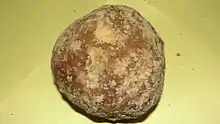jaggery
English

Jaggery.
Etymology
From Indo-Portuguese jágara, jagra, from Kannada ಶರ್ಕರೆ (śarkare), Urdu شکر (shakkar), from Sanskrit शर्करा (śárkarā). Doublet of sugar.
Noun
jaggery (countable and uncountable, plural jaggeries)
- A traditional unrefined sugar used throughout South and South-East Asia.
- 1681, Robert Knox, An Historical Relation of the Island Ceylon, London: Royal Society, Chapter 4, p. 15,
- The next Tree is the Kettule. […] It yieldeth a sort of Liquor, which they call Tellegie: it is rarely sweet and pleasing to the Pallate, and as wholsom to the Body, but no stronger than water. […] An ordinary Tree will yield some three, some four Gallons in a day, some more and some less. The which Liquor they boyl and make a kind of brown Sugar, called Jaggory; […]
- 1720, Daniel Defoe, Captain Singleton, London: J. Brotherton et al., p. 304,
- On Sunday, Oct. 12. being stored with all things needful for their Journey, viz. Ten Days Provision, a Basin to boil their Provision in, two Calabashes to fetch Water in, and two great Tallipat Leaves for Tents, with Jaggory, Sweet-meats, Tobacco, Betell, Tinder-Boxes, and a Deer-Skin for Shoes, to keep their Feet from Thorns, because to them they chiefly trusted.
- 1834, Ram Raz, Essay on the Architecture of the Hindus, London: Royal Asiatic Society of Great Britain and Ireland, p. 64,
- In all the operations of chunam work, jaggery water, i.e. a solution of molasses or coarse sugar, is invariably added by the builders, and its use appears to have prevailed from the remotest ages. There are various opinions among the modern practitioners regarding its usefulness, but those who have had the most extensive practice in building, hold it as an indispensable ingredient in the formation of a durable and hard cement; and it is stated that the operator evidently perceives the dissolvent property of the jaggery water, on its being tempered with the prepared mortar.
- 1958, R. K. Narayan, The Guide, Penguin: 1988, Chapter 6, p. 78,
- He counted the seasons by the special points that jutted out, such as the harvest in January, when his disciples brought him sugar cane and jaggery cooked with rice […]
- 1681, Robert Knox, An Historical Relation of the Island Ceylon, London: Royal Society, Chapter 4, p. 15,
- A small-scale production plant that processes sugar cane.
Descendants
- → French: jagré
- → Japanese: ジャガリー (jagarī), ジャッガリー (jaggarī)
- → Scottish Gaelic: seagaraidh
- → Serbo-Croatian: јаггери
Translations
traditional unrefined sugar
|
|
This article is issued from Wiktionary. The text is licensed under Creative Commons - Attribution - Sharealike. Additional terms may apply for the media files.